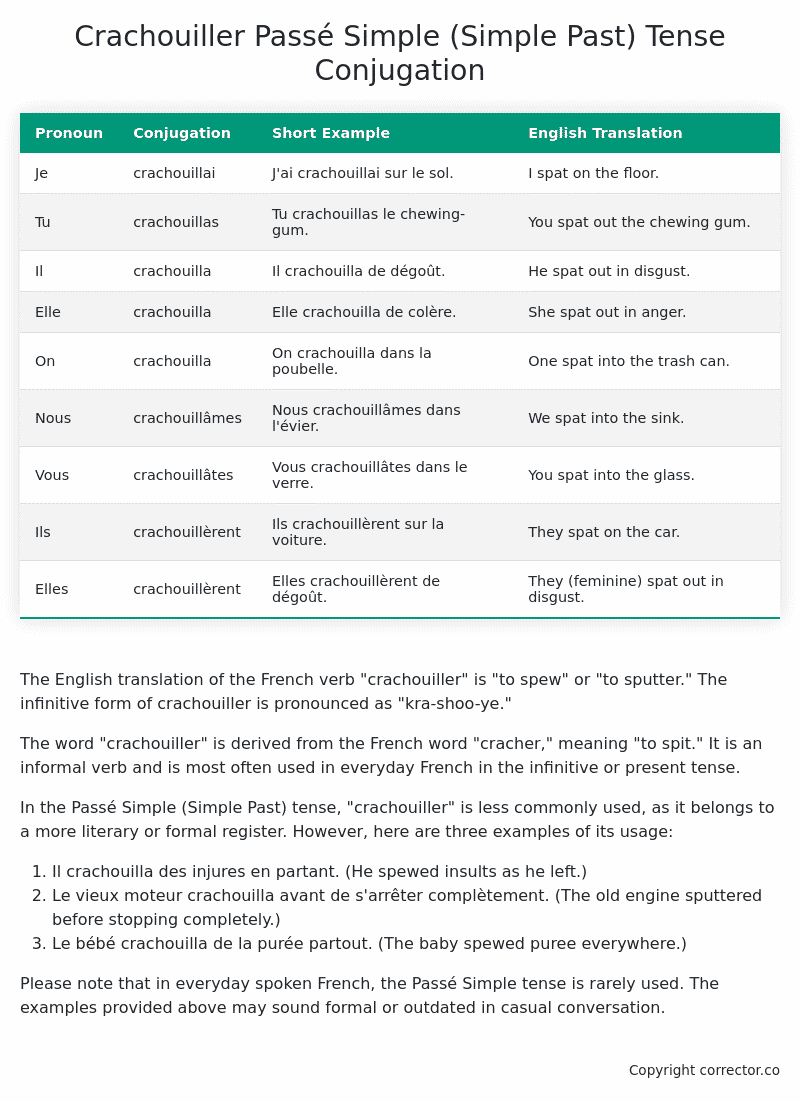Passé Simple (Simple Past) Tense Conjugation of the French Verb crachouiller
Introduction to the verb crachouiller
The English translation of the French verb “crachouiller” is “to spew” or “to sputter.” The infinitive form of crachouiller is pronounced as “kra-shoo-ye.”
The word “crachouiller” is derived from the French word “cracher,” meaning “to spit.” It is an informal verb and is most often used in everyday French in the infinitive or present tense.
In the Passé Simple (Simple Past) tense, “crachouiller” is less commonly used, as it belongs to a more literary or formal register. However, here are three examples of its usage:
- Il crachouilla des injures en partant.
(He spewed insults as he left.) - Le vieux moteur crachouilla avant de s’arrêter complètement.
(The old engine sputtered before stopping completely.) - Le bébé crachouilla de la purée partout.
(The baby spewed puree everywhere.)
Please note that in everyday spoken French, the Passé Simple tense is rarely used. The examples provided above may sound formal or outdated in casual conversation.
Table of the Passé Simple (Simple Past) Tense Conjugation of crachouiller
| Pronoun | Conjugation | Short Example | English Translation |
|---|---|---|---|
| Je | crachouillai | J’ai crachouillai sur le sol. | I spat on the floor. |
| Tu | crachouillas | Tu crachouillas le chewing-gum. | You spat out the chewing gum. |
| Il | crachouilla | Il crachouilla de dégoût. | He spat out in disgust. |
| Elle | crachouilla | Elle crachouilla de colère. | She spat out in anger. |
| On | crachouilla | On crachouilla dans la poubelle. | One spat into the trash can. |
| Nous | crachouillâmes | Nous crachouillâmes dans l’évier. | We spat into the sink. |
| Vous | crachouillâtes | Vous crachouillâtes dans le verre. | You spat into the glass. |
| Ils | crachouillèrent | Ils crachouillèrent sur la voiture. | They spat on the car. |
| Elles | crachouillèrent | Elles crachouillèrent de dégoût. | They (feminine) spat out in disgust. |
Other Conjugations for Crachouiller.
Le Present (Present Tense) Conjugation of the French Verb crachouiller
Imparfait (Imperfect) Tense Conjugation of the French Verb crachouiller
Passé Simple (Simple Past) Tense Conjugation of the French Verb crachouiller (You’re reading it right now!)
Passé Composé (Present Perfect) Tense Conjugation of the French Verb crachouiller
Futur Simple (Simple Future) Tense Conjugation of the French Verb crachouiller
Futur Proche (Near Future) Tense Conjugation of the French Verb crachouiller
Plus-que-parfait (Pluperfect) Tense Conjugation of the French Verb crachouiller
Passé Antérieur (Past Anterior) Tense Conjugation of the French Verb crachouiller
Futur Antérieur (Future Anterior) Tense Conjugation of the French Verb crachouiller
Subjonctif Présent (Subjunctive Present) Tense Conjugation of the French Verb crachouiller
Subjonctif Passé (Subjunctive Past) Tense Conjugation of the French Verb crachouiller
Subjonctif Imparfait (Subjunctive Imperfect) Tense Conjugation of the French Verb crachouiller
Conditionnel Présent (Conditional Present) Tense Conjugation of the French Verb crachouiller
Conditionnel Passé (Conditional Past) Tense Conjugation of the French Verb crachouiller
Conditionnel Passé II (Conditional Past II) Tense Conjugation of the French Verb crachouiller
L’impératif Présent (Imperative Present) Tense Conjugation of the French Verb crachouiller
L’impératif Passé (Imperative Past) Tense Conjugation of the French Verb crachouiller
L’infinitif Présent (Infinitive Present) Tense Conjugation of the French Verb crachouiller
L’infinitif Passé (Infinitive Past) Tense Conjugation of the French Verb crachouiller
Le Participe Présent (Present Participle) Tense Conjugation of the French Verb crachouiller
Le Participe Passé (Past Participle) Tense Conjugation of the French Verb crachouiller
Struggling with French verbs or the language in general? Why not use our free French Grammar Checker – no registration required!
Get a FREE Download Study Sheet of this Conjugation 🔥
Simply right click the image below, click “save image” and get your free reference for the crachouiller Passé Simple tense conjugation!

Crachouiller – About the French Passé Simple (Simple Past) Tense
Formation
Usage
Narration
Historical Context
Interactions with other tenses
Passé Composé
Imparfait
Conditional and Subjunctive
Summary
I hope you enjoyed this article on the verb crachouiller. Still in a learning mood? Check out another TOTALLY random French verb conjugation!


